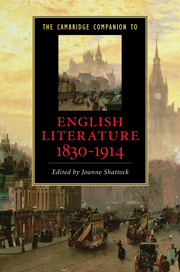Book contents
- Frontmatter
- Introduction
- Part 1 Modes of writing and their contexts
- 1 Authors and authorship
- 2 Readers and readerships
- 3 Life writing
- 4 The culture of criticism
- 5 Women’s voices and public debate
- 6 Writing the past
- 7 Radical writing
- 8 Popular culture
- Part II Intersections and incursions
- Part III The centre and the periphery
- Guide to further reading
- Index
7 - Radical writing
from Part 1 - Modes of writing and their contexts
Published online by Cambridge University Press: 28 November 2010
- Frontmatter
- Introduction
- Part 1 Modes of writing and their contexts
- 1 Authors and authorship
- 2 Readers and readerships
- 3 Life writing
- 4 The culture of criticism
- 5 Women’s voices and public debate
- 6 Writing the past
- 7 Radical writing
- 8 Popular culture
- Part II Intersections and incursions
- Part III The centre and the periphery
- Guide to further reading
- Index
Summary
Writing to his friend John Hobhouse from Italy in 1820, Byron commented on the term 'radical' that it was entirely new to him: 'Upon reform you have long known my opinion - but radical is a new word since my time - it was not in the political vocabulary of 1816 - when I left England - and I don't know what it means - is it uprooting?' Byron’s etymological understanding of the term is spot on, and in an abstract way tells us a great deal about the political force of nineteenth-century radicalism. The political temperature was running high in England in 1820: the 'Peterloo Massacre' of the previous year in which eleven peaceful demonstrators were killed was still fresh in the memory, and William Cobbett led a vanguard of popular protests in support of the exiled Queen Caroline. In this fevered political climate the journalist Thomas Wooler gave a characteristically witty account of the meaning of the term 'radical' in his trial parody, 'TRIAL EXTRAORDINARY: MR CANNING VERSUS THE RADICAL REFORMERS':
judge: What complaint have you to make, Mr Canning, against the men, whom I see there, behind you, looking so thin and pale, clothed in rags, and having pad-locks on their mouths and thumb-screws on their hands.
mr canning: Oh! Don't you know them? I thought all the world knew them! They are the Radicals.
judge: The Radicals, Sir! What does that name mean?
mr canning: Mean! (What a fool the man must be - aside) Mean! Why, it means everything that is bad.
- Type
- Chapter
- Information
- The Cambridge Companion to English Literature, 1830–1914 , pp. 127 - 146Publisher: Cambridge University PressPrint publication year: 2010

